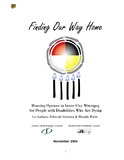| dc.description.abstract | This project encompassed three pertinent social issues: the lack of safe, affordable, available and accessible inner city Winnipeg housing; the lack of supports available for people living in the core area experiencing end of life transitions; and the barriers encountered by people with disabilities. Each of these issues stands on its own as an important topic for research. Merging these three streams not only compounds issues but also brings forward new concerns that have, according to our research, never been identified before.
The approach used in researching and presenting the information for Finding
Our Way Home was grounded in the understanding of disability as being the
product of the interaction between people and their environments (O’Day and Killeen, 2002). The Independent living concept is based on the assumption that
attitudes and perceptions about disability are not caused by a disease or impairment but through the interactions between persons within a larger social environment. Disability is self-declared; persons make this declaration in order to access services that will appropriately enhance their lives and help them achieve Independent living (Denson, 1988). | en_US |

